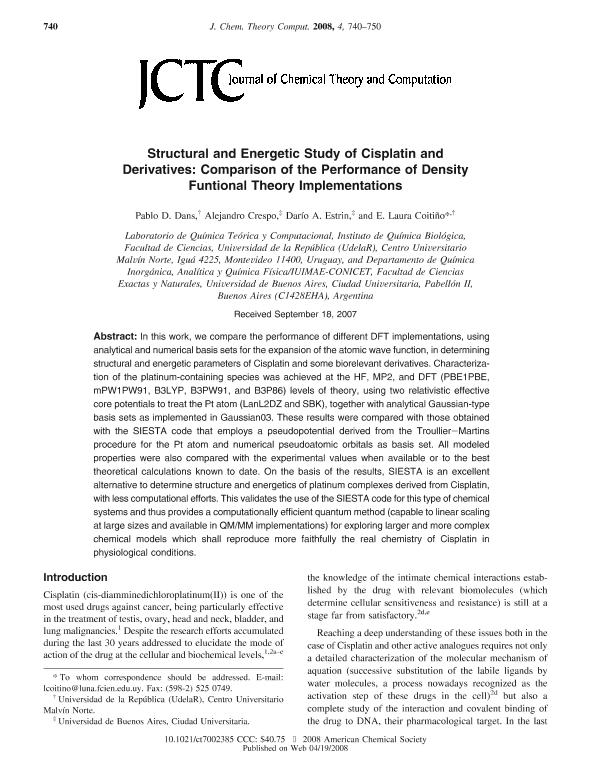Mostrar el registro sencillo del ítem
dc.contributor.author
Dans Puiggros, Pablo Ignacio Daniel

dc.contributor.author
Crespo, Alejandro

dc.contributor.author
Estrin, Dario Ariel

dc.contributor.author
Coitiño, E. Laura
dc.date.available
2020-04-21T14:52:01Z
dc.date.issued
2008-04
dc.identifier.citation
Dans Puiggros, Pablo Ignacio Daniel; Crespo, Alejandro; Estrin, Dario Ariel; Coitiño, E. Laura; Structural and Energetic Study of Cisplatin and Derivatives: Comparison of the Performance of Density Funtional Theory Implementations; American Chemical Society; Journal of Chemical Theory and Computation; 4; 5; 4-2008; 740-750
dc.identifier.issn
1549-9618
dc.identifier.uri
http://hdl.handle.net/11336/103123
dc.description.abstract
In this work, we compare the performance of different DFT implementations, using analytical and numerical basis sets for the expansion of the atomic wave function, in determining structural and energetic parameters of Cisplatin and some biorelevant derivatives. Characterization of the platinum-containing species was achieved at the HF, MP2, and DFT (PBE1PBE, mPW1PW91, B3LYP, B3PW91, and B3P86) levels of theory, using two relativistic effective core potentials to treat the Pt atom (LanL2DZ and SBK), together with analytical Gaussian-type basis sets as implemented in Gaussian03. These results were compared with those obtained with the SIESTA code that employs a pseudopotential derived from the Troullier−Martins procedure for the Pt atom and numerical pseudoatomic orbitals as basis set. All modeled properties were also compared with the experimental values when available or to the best theoretical calculations known to date. On the basis of the results, SIESTA is an excellent alternative to determine structure and energetics of platinum complexes derived from Cisplatin, with less computational efforts. This validates the use of the SIESTA code for this type of chemical systems and thus provides a computationally efficient quantum method (capable to linear scaling at large sizes and available in QM/MM implementations) for exploring larger and more complex chemical models which shall reproduce more faithfully the real chemistry of Cisplatin in physiological conditions.
dc.format
application/pdf
dc.language.iso
eng
dc.publisher
American Chemical Society

dc.rights
info:eu-repo/semantics/openAccess
dc.rights.uri
https://creativecommons.org/licenses/by-nc-sa/2.5/ar/
dc.subject
cisplatin
dc.subject
DFT
dc.subject.classification
Físico-Química, Ciencia de los Polímeros, Electroquímica

dc.subject.classification
Ciencias Químicas

dc.subject.classification
CIENCIAS NATURALES Y EXACTAS

dc.title
Structural and Energetic Study of Cisplatin and Derivatives: Comparison of the Performance of Density Funtional Theory Implementations
dc.type
info:eu-repo/semantics/article
dc.type
info:ar-repo/semantics/artículo
dc.type
info:eu-repo/semantics/publishedVersion
dc.date.updated
2020-04-17T14:41:56Z
dc.journal.volume
4
dc.journal.number
5
dc.journal.pagination
740-750
dc.journal.pais
Estados Unidos

dc.journal.ciudad
Columbus, OH
dc.description.fil
Fil: Dans Puiggros, Pablo Ignacio Daniel. Universidad de la República; Uruguay
dc.description.fil
Fil: Crespo, Alejandro. Universidad de Buenos Aires. Facultad de Ciencias Exactas y Naturales. Departamento de Química Inorgánica, Analítica y Química Física; Argentina. Consejo Nacional de Investigaciones Científicas y Técnicas; Argentina
dc.description.fil
Fil: Estrin, Dario Ariel. Consejo Nacional de Investigaciones Científicas y Técnicas; Argentina. Universidad de Buenos Aires. Facultad de Ciencias Exactas y Naturales. Departamento de Química Inorgánica, Analítica y Química Física; Argentina
dc.description.fil
Fil: Coitiño, E. Laura. Universidad de la República; Uruguay
dc.journal.title
Journal of Chemical Theory and Computation

dc.relation.alternativeid
info:eu-repo/semantics/altIdentifier/doi/https://doi.org/10.1021/ct7002385
dc.relation.alternativeid
info:eu-repo/semantics/altIdentifier/url/https://pubs.acs.org/doi/pdfplus/10.1021/ct7002385
Archivos asociados
